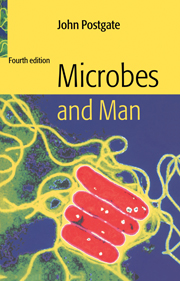Book contents
- Frontmatter
- Contents
- Illustrations
- Preface
- 1 Man and microbes
- 2 Microbiology
- 3 Microbes in society
- 4 Interlude: how to handle microbes
- 5 Microbes in nutrition
- 6 Microbes in production
- 7 Deterioration, decay and pollution
- 8 Disposal and cleaning-up
- 9 Second interlude: microbiologists and man
- 10 Microbes in evolution
- 11 Microbes in the future
- Further reading
- Glossary
- Index
4 - Interlude: how to handle microbes
Published online by Cambridge University Press: 18 December 2009
- Frontmatter
- Contents
- Illustrations
- Preface
- 1 Man and microbes
- 2 Microbiology
- 3 Microbes in society
- 4 Interlude: how to handle microbes
- 5 Microbes in nutrition
- 6 Microbes in production
- 7 Deterioration, decay and pollution
- 8 Disposal and cleaning-up
- 9 Second interlude: microbiologists and man
- 10 Microbes in evolution
- 11 Microbes in the future
- Further reading
- Glossary
- Index
Summary
The time has come, I think, to say something of how all these things are known. So often, in books of this kind, the author tells readers the results of scientific progress, paints a sort of panorama of presentday knowledge, without giving them any idea of how this progress came about, of how the knowledge was obtained. This, you may say, is just fine: as a lay reader you are prepared to take my authoritative word that everything written in this book is based on sound, wellconceived experiments.
Would that it were! The trouble with science is that its day-to-day aspects are extremely uncertain. Occasionally great and obvious advances in knowledge take place, but generally research and its applications progress by repetitious and tedious experiments, almost always giving negative or useless results, from which, slowly and over a long period, a picture of the behaviour of whatever-it-is the scientist is studying emerges. No scientific finding is 100 per cent certain; the majority of observations that find application are more than 90 per cent certain. Today, living in a society which depends for its existence on a highly developed technology, it is most important that laymen should be able to view critically the results of scientific research – or at least the claims made for them by journalists, scientists and scientific administrators. It would be very surprising, for example, if some of the information I have written in this book is not falsified by recent research before it is published. How, then, is one to judge what is likely to be well established and what is a little dicey?
- Type
- Chapter
- Information
- Microbes and Man , pp. 113 - 132Publisher: Cambridge University PressPrint publication year: 2000



